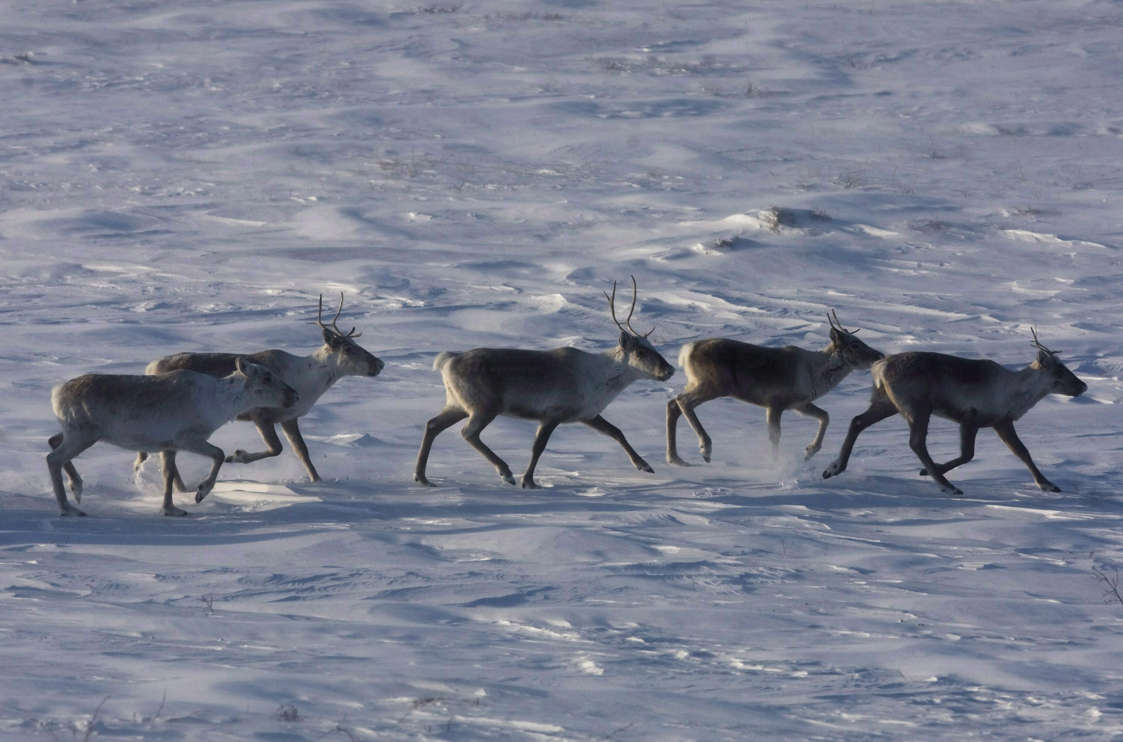
80 caribou illegally killed in last two weeks, N.W.T. Indigenous leaders say
CBC/Radio-Canada 3/4/2020
Indigenous leaders and government officials in the N.W.T. issued a joint statement Friday morning condemning illegal hunting after a two-week period when they say 80 caribou were illegally hunted from the threatened Bathurst herd.
A joint statement from Tłı̨chǫ Grand Chief George Mackenzie, Łutsel Kʼe Dene First Nation Chief Darryl Marlowe, and other unspecified "Indigenous regional leaders" says it is "disappointing to see animals being wasted in this way."
"This behaviour is not only disrespectful—it is illegal," it reads.
The Bathurst herd is one of nine barren-ground caribou herds, with its calving grounds near the Bathurst Inlet in Nunavut. Its range extends across the eastern N.W.T. and includes traditional hunting areas for the Tłı̨chǫ, Akaitcho, and Sahtu Dene.
Since 2018, barren-ground caribou have considered a "threatened species" by the territorial government. The Bathurst herd has experienced a rapid decline in size since 1986, and only 8,200 caribou remain. The herd is believed to have shrunk by as much as 98 per cent.
Hunting Bathurst caribou has been prohibited in the N.W.T since 2015. As their range intersects with several other herds, to limit harvest, the territory updates a "mobile core Bathurst caribou management zone" where hunting any caribou is prohibited.

© THE CANADIAN PRESS/Nathan Denette
File photo shows wild caribou near The Meadowbank
Gold Mine located in the Nunavut.
Individuals found to be hunting caribou in the zone have any meat seized and can face charges under the territory's Wildlife Act.
According to the release, officials from the territory's department of Environment and Natural Resources issued tickets to an unspecified number of hunters in the zone over the weekend, shortly after the N.W.T. shut its borders and introduced mandatory travel restrictions to prevent the spread of COVID-19.
Prior to those measures, Indigenous leaders encouraged hunters to go out on the land to minimize their contact with others.
"Prior to March 21, there had only been one case of harvesting in the mobile zone this winter," the release reads.
The release also voices "concern" from Indigenous leaders that hunters are disregarding advice from the territory's chief public health officer on physical distancing.

"Over the weekend, hunters along the winter road were observed travelling and gathering and visiting in groups," the release reads. "This behaviour goes against the advice of the Chief Public Health Officer, who supports people going out on the land, but only with their immediate family or people they live with."
"We understand this is a difficult and uncertain time for everyone," reads a quote attributed to Shane Thompson, the territory's minister of environment and natural resources. "It is up to all of us to ensure we are making good decisions to protect the health and safety of our communities and the future of our caribou.
"There are other animals that can be legally harvested at this time, including moose, muskox, fish, small game and other caribou herds. We encourage people to look at other options, and to harvest other animals respectfully and sustainably."
---30---

No comments:
Post a Comment